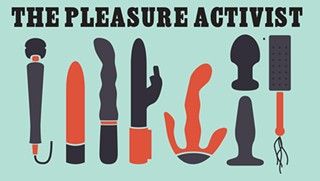I interviewed Kate Kincaid, a therapist specializing in counseling gender and sexual minorities, people in alternative relationship models, and issues such as infidelity, mistrust, and ineffective communication. Additionally, she provides poly/kink-awareness trainings and workshops for other counselors in order to improve services for members of the community.
Ally: How would you define polyamory and what are the biggest misconceptions?
Kate: I think the simplest definition is loving more than one person, but it's so much more than that! We all love more than one person, but that doesn't necessarily mean we are all polyamorous. The more nuanced definition is that it's an identity and/or lifestyle choice to ethically practice being in close, intimate, romantic or sexual relationships with more than one consenting person.
A lot of people who know nothing about polyamory think it's just an excuse to cheat or a fear of commitment. Many seem to think poly people are a bunch of oversexed heathens, which isn't necessarily untrue, but there's a lot more to it. In fact, ethically non-monogamous people tend to be very communicative and practice safer sex practices than the general population. Another misconception is that anything goes when in fact there are a lot of agreements and sophisticated rules of etiquette for dating within the poly community.
Ally: Not that much different than monogamous relationships if we recognize that all relationships have spoken or unspoken rules that if crossed can break the trust between partners. Basically negotiated rules and communication are the common denominator. Are you in a polyamorous relationship?
Kate: I do identify as polyamorous, and I have multiple partnerships currently. Even if I wasn't in any romantic relationships, I would still consider myself to be poly. It's more than a set of behaviors or relationship structures to me- its part of my identity. I've chosen it because I've always gravitated towards ideals and I believe it is the best path to personal evolution for me.
Ally: Would you compare it to a sexual orientation in that sense? For example, if someone identifies as bisexual, they are still bisexual even though they may happen to be in a same-sex relationship at that particular moment?
Kate: Exactly!!
Ally: What's your polyamory origin story?
Kate: I've basically been poly since 8th grade when I started dating. I was crushing hard on my boyfriend, but I also loved my neighborhood best friend too. Before I knew of the term or anything I guess you could say I was practicing non-monogamy, but it certainly wasn't ethical. It involved a lot of lying and didn't feel very good for anyone involved. After like six years of cheating, my then-college boyfriend and I decided to do a "don't ask don't tell" type of thing, where we both knew we were sleeping with other people but we didn't want to know details.
Ever since I've worked in a sex research lab, I learned that a lot of other people struggle with monogamy so it normalized it for me. I used to believe everyone was non-monogamous "by nature" and I was kind of militant about it. My views on it have evolved and I now believe that some people tend towards non-monogamy and some don't, it works for some people and doesn't for others, sometimes your life is set up to be conducive to it and sometimes it isn't. It's all very fluid. Now I've been practicing ethical polyamory for the past four years and it's so much better than any alternative for me.
Ally: Would you say there's a difference between unethical non-monogamy and polyamory?
Kate: I definitely feel a difference personally. It feels so good to be totally honest. It challenges me to be really brave and say exactly what I want. I don't judge people doing "unethical non-monogamy" as bad people at all. I empathize with not being able to express how you feel for fear of losing or hurting your partner. But I've personally found facing this fear to be extremely rewarding. But that is not necessarily true for everyone.
Ally: I'm glad to hear you're no longer "militant" about it! One of my dear friends was in an abusive relationship that was normalized by the kink-friendly couples therapist that they visited. The therapist was so invested in being a "kink" therapist that it acted like a blinder against certain red flags.
Kate: Gah! I cringe when I hear about experiences with therapists like that. That's why I want to get more into training my colleagues! Equally enraging is seeing people hiding abuse under the guise of polyamory. Abuse is never okay and if someone is unhappy and hurting, it should be addressed. It's so important to have help from people who can understand the difference—whether that be a good therapist or open-minded, understanding friends.
Ally: What's one thing you'd tell a polyamory "pro"?
Kate: You're never a pro. Every relationship is different and will challenge you in different ways. Just because you might have a lot of experience with the kinds of relationships you've been in or people you've dated, doesn't mean you know what works for others or your future partners. Stay open to learning and changing, and check yourself often!
Ally Booker is a pleasure activist, passionate about educating herself and others on sexuality topics like communication skills, boundaries, sexual self-determination, sex toy use and safety and all the other mechanics of pleasure. You can often find her at her Tucson shop, Jellywink Boutique, 418 E. 7th St. You




